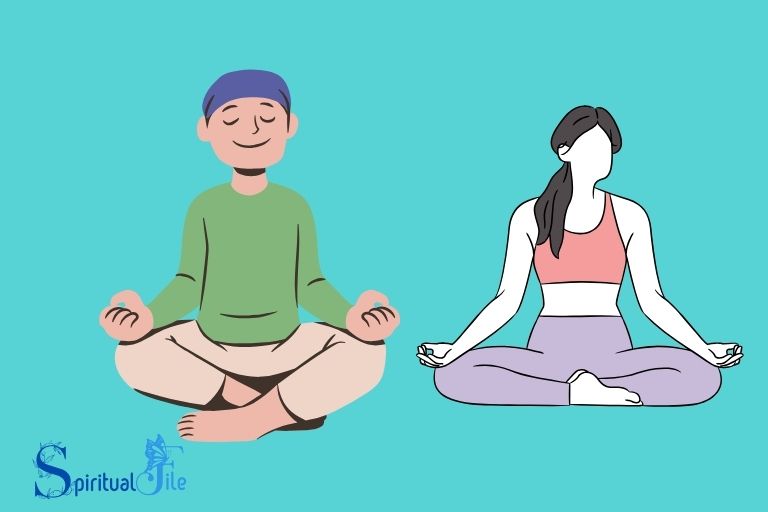Example of Spiritual Routine: Inner Peace!
A spiritual routine can involve various practices or rituals that foster inner peace and connect you to a higher power or your inner self.
An example could be starting the day with 30 minutes of meditation followed by reading spiritual literature, practicing mindfulness throughout the day, and ending the day with a gratitude journaling exercise.
A spiritual routine is a set of daily practices aimed at cultivating spiritual growth and wellbeing.
It often involves practices like meditation, prayer, reading spiritual texts, and other activities that foster mindfulness, gratitude, self-reflection, and connection with a higher power or self. The specific activities can vary depending on individual beliefs and preferences.
A daily spiritual routine like the one mentioned above, can significantly improve mental and emotional health. It provides a sense of purpose, inner peace, and helps manage stress.
By dedicating time to connect with our inner selves or a higher power, we open doors to greater self-awareness, understanding, and empathy towards others. It’s a personal journey that shapes our character and influences our perspective towards life.
8 Times of a Day: Examples of Spiritual Routine
| Time of Day | Activity | Description |
|---|---|---|
| 6:00 AM | Morning Prayers | Start the day with a prayer or spiritual affirmation to set a positive tone for the day. |
| 6:30 AM | Meditation | Spend 15 minutes calming the mind and focusing on inner peace. |
| 7:00 AM | Spiritual Reading | Read a chapter or passage from a spiritual text or devotional. |
| 12:00 PM | Mid-Day Reflection | Take a few moments to reflect on the morning and reset for the afternoon. |
| 6:00 PM | Evening Prayers | End the work day with a prayer or spiritual affirmation. |
| 7:00 PM | Spiritual Study | Dedicate time to study religious or spiritual teachings in depth. |
| 10:00 PM | Night Meditation | Prepare for sleep with a calming meditation. |
| 10:30 PM | Journaling | Write down reflections, insights, and goals for the next day. |
Key Takeaway

Five Facts About Spiritual Routines
Benefits Of A Spiritual Routine
Discover the numerous benefits of incorporating a spiritual routine into your daily life. By following an example of a spiritual routine, you can cultivate inner peace and clarity, strengthen your connection with the divine, and experience overall spiritual growth.
Spiritual routines offer numerous benefits that not only enhance our well-being but also deepen our connection with our higher selves.
By incorporating a spiritual routine into our lives, we can experience physical and emotional well-being, increased inner peace and clarity, and an enhanced connection with our higher self.
Physical And Emotional Well-Being
- Reduced stress levels: Engaging in spiritual practices such as meditation, yoga, or prayer can lower the production of stress hormones, resulting in reduced anxiety and improved overall mental health.
- Improved sleep quality: A spiritual routine helps calm the mind, making it easier to relax and fall into a deep, rejuvenating sleep.
- Increased energy levels: By connecting with our higher self through spiritual practices, we tap into a source of limitless energy, revitalizing our body and mind.
Increased Inner Peace And Clarity
- Heightened self-awareness: Regular spiritual practices lead to a deeper understanding of ourselves, our thoughts, and emotions. This self-awareness allows us to make conscious choices aligned with our values and purpose.
- Mental clarity and focus: Spiritual routines help quiet the noise of our busy minds, allowing us to focus and concentrate better on our daily tasks. This increased mental clarity enhances our decision-making abilities and problem-solving skills.
- Emotional balance: Through spiritual practices, we cultivate emotional resilience, gaining the ability to navigate life’s challenges with composure and serenity.
Enhanced Connection With Higher Self
- Intuition and guidance: A spiritual routine helps us tune into our inner wisdom, strengthening our connection with our higher self. This connection opens the door to receiving intuitive insights and guidance, leading us towards our highest good.
- Expanded consciousness: Regular spiritual practices expand our consciousness, enabling us to perceive the world from a broader, more enlightened perspective. This expanded awareness allows us to engage with life authentically and compassionately.
- Aligning with purpose: As we deepen our connection with our higher self, we gain clarity about our life purpose and the path we should take. This alignment brings a sense of fulfillment and meaning to our lives.
Incorporating a spiritual routine into our daily lives can bring tremendous benefits to our overall well-being.
By nurturing our physical and emotional health, cultivating inner peace and clarity, and deepening our connection with our higher self, we embark on a transformative journey of self-discovery and personal growth.
Morning Rituals To Start Your Day
Start your day with a rejuvenating spiritual routine. Embrace morning rituals like meditation, gratitude practice, and gentle yoga to nourish your mind, body, and soul, setting the tone for a positive and balanced day ahead.
Starting your day with a set of morning rituals can help create a positive and intentional mindset for the rest of the day.
By incorporating practices such as setting positive intentions, mindful meditation, and journaling for self-reflection, you can cultivate a sense of clarity, peace, and purpose in your daily life.
Setting Positive Intentions:
- Take a moment each morning to set positive intentions for the day ahead.
- Visualize your goals and desires, focusing on the positive outcomes you wish to achieve.
- Repeat affirmations or mantras that resonate with you, reinforcing positive beliefs and attitudes.
- By setting positive intentions, you create a mental framework that guides your actions and mindset throughout the day.
Mindful Meditation:
- Begin your day with a few minutes of mindful meditation to cultivate a sense of calmness and presence.
- Find a quiet space where you can sit comfortably and close your eyes.
- Focus on your breath, observing each inhale and exhale without judgment.
- Allow thoughts to arise and pass while gently redirecting your attention back to your breath.
- By practicing mindful meditation, you can reduce stress, increase self-awareness, and enhance your overall well-being.
Journaling For Self-Reflection:
- Dedicate time in the morning to journaling, allowing for self-reflection and inner exploration.
- Write freely without judgment, expressing your thoughts, emotions, and experiences.
- Reflect on the previous day, acknowledging moments of gratitude, accomplishments, and areas for growth.
- Set intentions for personal development and identify actionable steps to work towards your goals.
- Journaling serves as a powerful tool for self-discovery, problem-solving, and fostering a deeper understanding of yourself.
Incorporating these morning rituals into your routine can transform your day-to-day experiences and mindset.
By setting positive intentions, engaging in mindful meditation, and journaling for self-reflection, you create a foundation of awareness, positivity, and growth, enabling you to navigate each day with purpose and clarity.
Embrace these rituals and witness the profound impact they can have on your overall well-being.
Nurturing Your Spirit Throughout The Day
Discover an example of a spiritual routine that beautifully nurtures your spirit throughout the day, bringing inner peace and harmony into your life.
Embrace practices such as meditation, affirmations, and gratitude to cultivate a deeper connection with your spiritual self and experience profound positivity.
Nurturing your spirit and cultivating a deep sense of inner peace and fulfillment is an essential aspect of leading a meaningful and balanced life.
Integrating spiritual practices into your daily routine can help you stay grounded, connected, and open to the world around you.
Here are a few powerful ways to nurture your spirit throughout the day:
Incorporating Mindfulness Into Everyday Activities
Morning meditation: Begin your day by setting aside a few moments for quiet reflection. Sit in a comfortable position, close your eyes, and bring your attention to your breath.
Allow yourself to become fully present in the moment, observing your thoughts and emotions without judgment.
Mindful eating: Rather than rushing through your meals, take the time to savor each bite. Pay attention to the flavors, textures, and smells of your food.
This simple act of mindful eating can transform a mundane task into a nourishing and meditative experience.
Mindful walking: Whether you’re strolling through a park or walking to work, make an effort to be fully aware of each step you take.
Feel the ground beneath your feet, notice the movement of your body, and tune in to the sights and sounds around you. Walking mindfully can bring a sense of calm and presence to your daily routine.
Digital detox: In today’s technology-driven world, it’s easy to become consumed by screens and constant stimulation.
Set aside dedicated time each day to unplug from devices and engage in activities that nourish your spirit. This could be reading a book, practicing a hobby, or simply enjoying quiet contemplation.
Practicing Gratitude And Appreciation
- Gratitude journaling: Take a few minutes each day to write down three things you are grateful for. This simple practice can shift your focus towards the positive aspects of your life and cultivate a deeper sense of gratitude.
- Express appreciation: Make a habit of expressing gratitude towards others. Whether it’s a heartfelt thank you note, a kind word, or a small act of kindness, showing appreciation fosters connection and uplifts both the giver and receiver.
- Reflect on blessings: Throughout the day, pause and reflect on the blessings that surround you. Notice the beauty of nature, cherish moments of joy, and acknowledge the relationships and experiences that bring meaning to your life.
Engaging In Acts Of Kindness
Random acts of kindness: Brighten someone’s day by performing a random act of kindness.
It could be as simple as holding the door for a stranger, complimenting a coworker, or offering help to someone in need. Small acts of kindness have the power to create ripple effects of positivity.
Volunteering: Dedicate your time and energy to a cause that aligns with your values. Whether it’s assisting at a local charity, volunteering in your community, or participating in outreach programs, giving back selflessly can enrich your spirit and bring profound fulfillment.
Supporting others: Be a source of support for those around you. Listen actively, offer encouragement, and lend a helping hand whenever possible. By uplifting others, you create a nurturing and compassionate environment that fosters spiritual growth.
Incorporating mindfulness into everyday activities, practicing gratitude and appreciation, and engaging in acts of kindness are powerful ways to nourish your spirit throughout the day.
By cultivating these habits, you can deepen your connection with yourself, others, and the world, leading to a more fulfilling and spiritually enriched life.
Sacred Spaces For Spiritual Retreat
Discover sacred spaces that provide an example of a spiritual routine, offering peaceful retreats for individuals seeking serenity and connection.
Immerse yourself in tranquil environments that foster introspection and rejuvenation, allowing you to embark on a profound spiritual journey.
Having a sacred space for your spiritual retreat can greatly enhance your spiritual practice and provide a sense of tranquility and peace.
Creating a personal altar, designing a meditation corner, and transforming your bedroom into a sanctuary are all wonderful ways to cultivate a sacred space in your home.
Let’s explore each of these in detail:
Creating A Personal Altar
A personal altar is a designated space where you can connect with the divine and focus on your spiritual practice.
Here are some ideas for creating your own personal altar:
- Choose a location: Find a quiet corner of your home where you can set up your altar. It could be a small table or shelf, preferably in a peaceful area.
- Select meaningful objects: Gather items that hold personal significance to you, such as crystals, statues, or sacred symbols. These objects should evoke positive emotions and help you connect with your spirituality.
- Arrange with intention: Place your objects on the altar mindfully, considering their symbolic meaning and the energy they hold. Arrange them in a way that resonates with you.
- Add elements of nature: Incorporate elements of nature, such as flowers, plants, or seashells, to bring a sense of grounding and connection to the natural world.
- Keep it clean and sacred: Regularly clean and purify your altar space. Dedicating it solely to your spiritual practice will help maintain its sacredness.
Designing A Meditation Corner
A meditation corner is a dedicated space where you can find inner calm and cultivate mindfulness.
Here are some tips for creating your own meditation corner:
- Choose a quiet spot: Find a peaceful area in your home where you can meditate without distractions. It could be a corner of a room or even a cozy nook near a window.
- Comfortable seating: Invest in a comfortable cushion or chair that supports good posture during meditation. It should be inviting and conducive to relaxation.
- Soft lighting: Opt for soft, diffused lighting or natural light if possible. Harsh lighting can be distracting, while gentle lighting creates a soothing atmosphere.
- Aromatherapy: Enhance your meditation experience by incorporating calming scents like lavender or sandalwood. You can use essential oils or scented candles (with caution).
- Personalized touches: Decorate your meditation corner with items that inspire you, such as inspirational quotes, artwork, or a vision board. Make it a reflection of your spiritual journey.
Transforming Your Bedroom Into A Sanctuary
Your bedroom can be transformed into a serene sanctuary, providing a peaceful space for relaxation and spiritual reflection.
Consider the following ideas to create a sanctuary within your bedroom:
- Declutter and minimize distractions: Remove unnecessary clutter and keep your bedroom free from distractions like electronic devices. Create an environment free from chaos.
- Calming colors and soft textures: Choose soothing colors for your bedroom like blues, greens, or neutrals. Incorporate soft textures through bedding, curtains, or rugs to create a cozy and peaceful atmosphere.
- Comfortable bedding: Invest in comfortable and high-quality bedding that promotes restful sleep. A well-rested body and mind are essential for spiritual growth.
- Ambient sounds and nature-inspired scents: Create a tranquil ambiance by playing soft, soothing music or nature sounds. Use diffusers or infusers to fill the air with calming scents like jasmine or chamomile.
- Remove work-related items: Keep your bedroom separate from work by removing any work-related items or reminders from your sleeping space. The bedroom should be a place of rest and relaxation.
By creating these sacred spaces for spiritual retreat within your home, you will have dedicated areas to nourish your soul, cultivate inner peace, and deepen your spiritual practice.
Connecting With Nature And The Universe
Discover a spiritual routine that connects you with nature and the universe, allowing you to tap into a higher consciousness and find inner peace.
Explore practices such as meditation, mindful walking, and journaling to deepen your spiritual connection and bring harmony to your life.
Going For Nature Walks Or Hikes
Spending time in nature is a fantastic way to connect with the universe and nurture your spiritual well-being.
Here are some reasons why going for nature walks or hikes can be a valuable part of your spiritual routine:
- Grounding: Walking barefoot on the earth, also known as grounding or earthing, can help you connect with nature and absorb its healing energy. Feeling the grass beneath your feet or the texture of the forest floor can provide a sense of grounding and tranquility.
- Reconnecting with the natural world: In our fast-paced lives, it’s easy to become disconnected from nature. Going for walks in natural environments allows us to reconnect, appreciate the beauty around us, and find solace in the simplicity of the natural world.
- Mindfulness: Walking in nature can be a meditative experience. By focusing on the sounds, smells, and sights of your surroundings, you can practice mindfulness and be fully present in the moment.
- Stress relief: Spending time in nature has been shown to reduce stress levels and promote relaxation. The peacefulness and tranquility of natural settings can help you release tension and find inner peace.
- Physical exercise: Nature walks and hikes provide the added benefit of physical activity. Engaging in exercise outdoors not only improves your fitness but also boosts your mood by releasing endorphins, making it a holistic practice for your mind, body, and spirit.
Stargazing And Celestial Observations
Looking up at the night sky can be a mesmerizing and spiritual experience. By immersing yourself in celestial observations, you can deepen your connection with the universe.
Here are some ways stargazing can be an essential part of your spiritual routine:
Awe and wonder: The vastness and beauty of the night sky can evoke a sense of awe and wonder, reminding us of the grandeur of the universe and our place within it.
Witnessing the constellations, shooting stars, or meteor showers can inspire a sense of humility and reverence.
Contemplation and reflection: Stargazing provides an opportunity for introspection and contemplation.
As you gaze at the stars, you may find yourself pondering life’s big questions, exploring your purpose and connection to the universe.
Cosmic energy: Some spiritual traditions believe that celestial bodies emit powerful energy that can influence our well-being. By observing the stars, you can tap into this cosmic energy and align yourself with the universal flow.
Stellar mindfulness: Stargazing encourages us to slow down, be present, and appreciate the beauty of the present moment. By focusing on each star and its unique qualities, you can cultivate a sense of mindfulness and deepen your connection with the universe.
Practicing Grounding Techniques
Grounding techniques are an effective way to connect with nature, restore balance, and enhance your spiritual well-being.
Here are some grounding techniques you can practice as part of your spiritual routine:
- Earthing: As mentioned earlier, walking barefoot on the earth can help you ground yourself. Find a patch of grass, a sandy beach, or a forest trail, and embrace the tactile experience of connecting directly with the earth.
- Rooting visualization: Close your eyes and envision roots growing from the soles of your feet into the ground. Imagine these roots anchoring you to the earth and drawing up its powerful, grounding energy.
- Tree hugging: Find a tree that resonates with you and wrap your arms around it. Feel its solidness and imagine exchanging energy with the tree, receiving its strength and stability.
- Meditative breathing: Sit or stand outside and focus on your breath. Take slow, deep breaths, visualizing that with each inhalation, you are drawing in grounding energy from the earth, and with each exhale, releasing any tension or negative energy.
Incorporating these grounding techniques into your spiritual routine can help you feel more connected to the earth, the universe, and your inner self. Embrace the beauty of nature, gaze at the stars, and ground yourself to enhance your spiritual journey.
Rituals For Spiritual Cleansing And Protection
Achieve spiritual cleansing and protection with these powerful rituals. Start your spiritual routine with practices such as meditation, smudging, and energy cleansing to create a harmonious environment.
Cleansing and protecting your spiritual energy is essential for maintaining balance and harmony in your life.
By incorporating these powerful rituals into your spiritual routine, you can clear negative energy, enhance your intuition, and create a sacred space for self-reflection and wellbeing.
Here are three effective practices to consider:
Sage Smudging And Incense Burning
- Sage smudging: Light a bundle of dried sage and let the smoke waft through your space, focusing on areas that feel heavy or stagnant. This ancient practice is believed to cleanse negative energy and invite positive vibrations.
- Incense burning: Choose scents like sandalwood, lavender, or frankincense to purify your surroundings and create a serene atmosphere. Allow the fragrance to fill the air as you set your intentions and release any negative thoughts or emotions.
Energy Clearing With Crystals
- Black tourmaline: Carry this protective crystal with you or place it in key areas of your home to absorb negative energy and enhance a sense of safety.
- Clear quartz: Known as the master healer, clear quartz amplifies positive energy and clarifies your intentions. Hold or meditate with it to promote spiritual healing and purification.
- Selenite: This crystal has a high vibration that can cleanse your energy field and remove blockages. Place selenite near your bed or carry it with you to experience its calming and rejuvenating effects.
Spiritual Baths And Showers
- Salt baths: Add a cup of sea salt or himalayan pink salt to your bathwater to draw out toxins and negative energy. As you soak, visualize the salt purifying and renewing your energy.
- Herbal baths: Infuse your bathwater with herbs like rosemary, lavender, or chamomile to cleanse, relax, and uplift your spirit. These botanicals promote emotional healing and inner peace.
- Water cleansing in the shower: Allow the water to flow over your body, envisioning it washing away any lingering negativity or stress. As the water cascades, feel its purifying and revitalizing energy enveloping you.
Incorporating these rituals into your spiritual routine can help you create a sacred space within and around you, fostering a sense of peace, protection, and spiritual growth.
Experiment with these practices and find what resonates most with you. Remember, consistency and intention are key to unlocking the transformative power of these rituals.
Embrace them as opportunities to nurture your spiritual wellbeing and cultivate a deeper connection with yourself and the divine.
Daily Affirmations And Mantras
Start your spiritual routine with daily affirmations and mantras, empowering practices to cultivate a positive mindset and inner harmony. Embrace the power of positive self-talk and manifest your desired outcomes through focused intention and repetition.
Example Of Spiritual Routine: Daily Affirmations And Mantras
In the pursuit of spiritual growth and self-discovery, incorporating daily affirmations and mantras into your routine can have a profound impact on your well-being and mindset.
These powerful practices help cultivate positive thoughts, align your energy, and bring about a sense of peace and inner harmony.
Allow yourself to dive deep into the world of affirmations and mantras, as we explore the benefits and ways to personalize these practices to suit your spiritual journey.
Using Positive Affirmations
Positive affirmations are powerful statements that are repeated to yourself in order to rewire negative thought patterns and replace them with empowering beliefs.
By consistently practicing positive affirmations, you can shift your mindset and attract abundance, happiness, and success.
Here are some ways to effectively use positive affirmations:
Start your day with affirmations: Begin each morning by affirming positive statements about yourself, such as “i am worthy of love and happiness” or “i am capable of achieving my goals.” Repeat these affirmations while looking into a mirror to strengthen their impact.
Write them down: Take a few moments each day to write down your affirmations in a journal or on sticky notes. Place them in visible areas, like your bathroom mirror or workspace, to remind yourself of the affirmations throughout the day.
Use present tense and emotion: Craft your affirmations in the present tense, as if they are already true. Add an emotional element to your affirmations, allowing yourself to deeply feel the truth in each statement.
Repeat throughout the day: Reinforce your affirmations by repeating them silently or aloud whenever negative thoughts arise. This helps to reprogram your subconscious mind and redirect your focus towards positivity.
Chanting Mantras For Spiritual Alignment
Mantras are sacred sounds, words, or phrases that are repeated during meditation or throughout the day to enhance spiritual alignment and connection. Chanting mantras can bring about a sense of tranquility, deepen meditation practice, and elevate consciousness.
Here’s how you can integrate chanting mantras into your spiritual routine:
Choose a mantra: Select a mantra that resonates with you and aligns with your spiritual intentions. It can be a traditional mantra from ancient texts or a personal affirmation that holds personal significance.
Establish a dedicated practice: Set aside a specific time each day to chant your chosen mantra. Create a peaceful environment, free from distractions, to fully immerse yourself in the practice.
Focus on breath and sound: As you chant your mantra, synchronize your breath with the rhythm of the chant. Allow the sound vibrations to penetrate your being, creating a sense of calm and inner connection.
Explore different techniques: Experiment with different chanting techniques, such as japa (repetition with the use of mala beads), kirtan (group chanting accompanied by music), or silently repeating the mantra during meditation. Find the method that resonates with you the most.
Personalizing Affirmation And Mantra Practices
While there are general guidelines for using affirmations and mantras, personalizing these practices can enhance their effectiveness and make them more meaningful to you.
Here are some ways to personalize your affirmation and mantra practices:
- Use specific and meaningful statements: Tailor your affirmations to address specific areas of your life or personal growth that you wish to focus on. Make them personal and relevant to your journey.
- Modify traditional mantras: If traditional mantras don’t resonate with you, feel free to modify or create your own mantras. Infuse them with intentions and qualities that you aspire to embody.
- Incorporate visualization: Combine affirmations or mantras with visualization techniques. Imagine yourself living your desired reality or embodying the qualities you aspire to have while repeating the affirmation or mantra.
- Trust your intuition: Allow your intuition to guide you in choosing the right affirmations and mantras for yourself. Listen to what resonates deep within your heart and soul.
By incorporating positive affirmations and chanting mantras into your spiritual routine, you can witness transformative shifts in your mindset and connection with the divine.
Embrace the power of these practices and personalize them to align with your unique spiritual journey.
Incorporating Rituals Into Mealtime
Learn how to incorporate spiritual routines into your mealtimes with this example of incorporating rituals. Discover the power of intentional practices that can bring meaning and mindfulness to your daily meals.
Mealtime is not just about satisfying our physical hunger; it can also be a sacred experience that nourishes our soul. By incorporating rituals into our mealtime routine, we can create a deeper connection with ourselves, our food, and the divine.
In this section, we will explore three powerful rituals that can enhance your mealtime experience: blessing and gratitude before meals, mindful eating meditation, and preparing meals with love and intention.
Blessing And Gratitude Before Meals:
- Before digging into your delicious meal, take a moment to pause and express gratitude.
- Bless your food with words of appreciation for the nourishment it provides.
- Acknowledge the efforts of everyone involved in bringing the meal to your plate, from the farmers who grew the ingredients to the cooks who prepared the dish.
- Reflect on the interconnectedness of all beings and the earth that sustains us.
- Embrace the gratitude in your heart and let it infuse your meal with love and positive energy.
Mindful Eating Meditation:
- Engage all your senses in the act of eating by turning it into a mindful meditation.
- Before taking your first bite, observe the colors, shapes, and textures of the food in front of you.
- Inhale the aroma and let it awaken your senses.
- Take small, intentional bites, savoring the flavors and textures on your tongue.
- Chew slowly and mindfully, fully experiencing each mouthful.
- Be present in the moment, letting go of distractions and focusing solely on the act of eating.
- Tune in to your body’s cues of hunger and satiety, honoring its needs with compassion.
Preparing Meals With Love And Intention:
- Approach meal preparation as a sacred ritual in itself.
- Create a serene and inviting environment in your kitchen, allowing positive energy to flow.
- Engage in the process wholeheartedly, with love and intention.
- As you chop vegetables or stir a pot, infuse the ingredients with your positive energy and intentions.
- Visualize the love and nourishment that the meal will provide to those who consume it.
- Honor the food’s origin and journey, treating it with reverence and respect.
- Embrace the opportunity to nurture yourself and others through the act of preparing a delicious meal.
By incorporating these simple yet profound rituals into your mealtime routine, you can transform a mundane task into a sacred practice.
Whether you are enjoying a simple meal or a festive feast, these rituals can deepen your connection with spirituality and nourish your body, mind, and soul.
Evening Practices For Inner Reflection
Evening practices for inner reflection provide a spiritual routine for individuals seeking personal growth and self-awareness.
By setting aside time each evening to reflect on their thoughts, emotions, and actions, individuals can cultivate a deeper connection with themselves and their spirituality.
This practice encourages introspection and provides an opportunity for personal growth and self-discovery.
Reviewing The Day With Self-Compassion
- Take a few minutes to reflect on your day with self-compassion.
- Remind yourself that it is normal to make mistakes and face challenges.
- Acknowledge your accomplishments and things you are grateful for.
- Resist self-judgment and replace it with self-kindness.
- Embrace the lessons learned from any difficulties encountered.
Journaling For Release And Healing
- Find a quiet space and grab your journal to release and heal from the day’s events.
- Write freely, without judgment or worry about grammar or spelling.
- Explore your emotions, thoughts, and experiences from the day.
- Identify any areas where you felt stuck or triggered, and seek insights into why they occurred.
- Reflect on any patterns or recurring themes that may have emerged.
- Use journaling as an opportunity to let go of any negativity or stress.
Relaxing Body And Mind With A Bedtime Ritual
- Establish a relaxing bedtime routine to unwind and prepare for a restful sleep.
- Begin by switching off electronic devices at least an hour before bedtime.
- Create a soothing ambiance in your bedroom with dim lighting or candles.
- Practice deep breathing exercises or meditation to calm the mind.
- Engage in activities that promote relaxation, such as reading a book or taking a warm bath.
- Consider incorporating gentle stretches or light yoga to release tension from the body.
- Gentle affirmations or prayers can help cultivate a sense of peace and tranquility.
- Finally, ensure your sleep environment is comfortable, with a supportive mattress and pillows.
Remember, developing an evening routine for inner reflection is a personal journey. Allow yourself the flexibility to adapt and customize these practices to suit your own needs and preferences.
Implementing these evening rituals can cultivate a sense of peace, self-awareness, and emotional well-being, paving the way for a more centered and serene state of mind.
Cultivating Spiritual Connections Through Community
Discover how individuals can cultivate spiritual connections through community, using an example of a spiritual routine that fosters a sense of belonging, growth, and support.
This article explores the importance of communal practices in deepening one’s spiritual journey and creating meaningful connections with others.
Building a spiritual routine involves not only personal practices but also connecting with others who share similar beliefs and interests. Engaging in spiritual community enhances your spiritual journey and provides a supportive network for growth and exploration.
Here are a few ways you can cultivate spiritual connections through community:
Joining A Spiritual Group Or Circle:
- Connect with like-minded individuals by joining a spiritual group or circle.
- Gain support, guidance, and encouragement from others on a similar spiritual path.
- Share experiences, insights, and learn from the knowledge of others.
- Deepen your understanding of spiritual concepts through group discussions and reflections.
Attending Workshops And Retreats:
- Attend workshops and retreats focused on spiritual themes to expand your knowledge and personal growth.
- Immerse yourself in a nurturing and transformative environment.
- Learn from experienced teachers and facilitators who can offer guidance and inspiration.
- Engage in activities such as meditation, yoga, or mindfulness practices to deepen your spiritual connection.
Participating In Volunteer And Service Activities:
- Engage in volunteer and service activities aligned with your spiritual values.
- Contribute to the well-being of others and the community.
- Find fulfillment by working towards positive social change and helping those in need.
- Connect with others who share the same passion for making a difference.
By actively participating in these community-based activities, you can develop meaningful connections with others who share your spiritual journey.
Engaging in spiritual groups, attending workshops and retreats, and participating in volunteer and service activities can offer support, learning opportunities, and a sense of belonging. Embrace the power of community as you cultivate your spiritual practice.
FAQ About on Example Of Spiritual Routine
What Is Spiritual Routine?
A spiritual routine is a regular practice that helps individuals connect with their inner selves and a higher power. It involves various activities such as meditation, prayer, yoga, journaling, and reading spiritual texts.
By incorporating these practices into their daily lives, individuals aim to cultivate a deeper sense of spirituality and develop a stronger connection with the divine.
Spiritual routines not only provide a regular structure to one’s spiritual journey but also offer a sense of inner peace, clarity, and purpose. They can be personalized based on individual preferences and beliefs.
Engaging in a spiritual routine regularly can have a positive impact on mental, emotional, and physical well-being, promoting self-reflection, and fostering a deeper understanding of life’s purpose.
What Are Some Daily Spiritual Practices?
Some daily spiritual practices include meditation, prayer, journaling, and mindful breathing exercises. Meditation helps quiet the mind and improve focus. Prayer allows for connection with a higher power or inner self.
Journaling promotes self-reflection and clarity of thoughts. Mindful breathing exercises help ground oneself in the present moment.
What Is An Example Of Being Spiritual?
An example of being spiritual is practicing mindfulness and meditation.
How Do You Practice Spirituality In Yourself Or Life?
Spirituality can be practiced in various ways in your life. Recognize the importance of self-reflection and mindfulness. Cultivate gratitude and engage in daily affirmations.
Connect with nature through meditation or spending time outdoors. Embrace a regular spiritual practice that aligns with your beliefs, such as prayer or yoga.
Surround yourself with positive and like-minded individuals who support your spiritual journey. Seek guidance from spiritual teachers or mentors. Explore spiritual texts or literature that resonate with you.
Engage in acts of kindness and service to others. Trust your intuition and listen to your inner voice.
Embrace moments of silence and solitude to nurture your inner peace.
Ultimately, finding your own unique way to incorporate spirituality into your life is key.
What Are The Benefits Of Having A Spiritual Routine?
A spiritual routine brings inner peace, clarity, and a sense of purpose, while helping to reduce stress levels.
Conclusion
To wrap up, building a spiritual routine can have a profound impact on our overall well-being and sense of purpose.
By incorporating practices such as meditation, journaling, and gratitude into our daily lives, we can cultivate a deeper connection with ourselves and the world around us.
These rituals help to ground us in the present moment, allowing us to find peace amidst the chaos of everyday life.
Additionally, a spiritual routine can provide us with a sense of direction and clarity, helping us navigate through challenging times and make decisions that align with our values.
Remember, there is no one-size-fits-all approach to spirituality, so it is essential to experiment with different practices and find what resonates with you.
By dedicating time and intention to nurturing our spiritual well-being, we can lead more fulfilling, balanced lives. So, start today and embark on a journey to discover and strengthen your spirituality.






